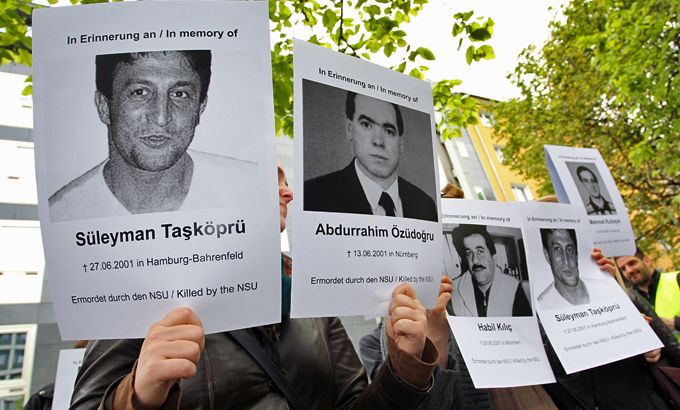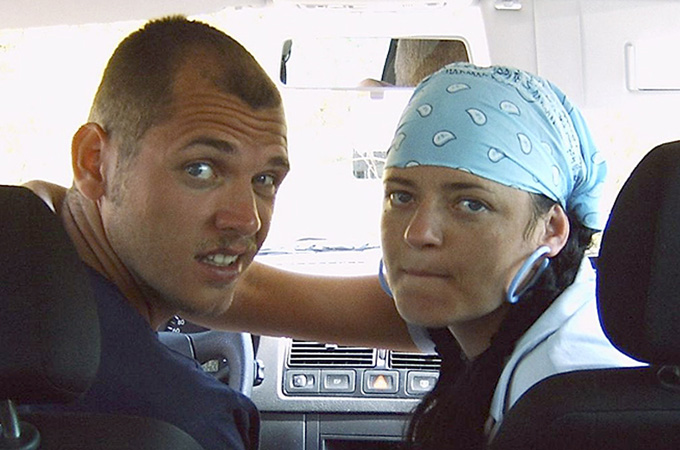Neo-Nazi murder trial begins in Germany
Alleged member of National Socialist Underground cell tried in Munich over series of racially motivated murders.

A high-profile neo-Nazi trial that focuses on 10 mostly racially motivated murders by an underground far-right gang has started in Munich.
German Beate Zschaepe, believed to be the last surviving member of the National Socialist Underground (NSU) group, and four others accused of assisting the gang, are being tried.
Zschaepe, 38, is charged with complicity in the murder of eight Turks, a Greek and a policewoman between 2000-2007, as well as two bombings in immigrant areas of Cologne, and 15 bank robberies.
It is the highest-profile neo-Nazi murder trial in Germany in decades and could last at least a year.
The case has been controversial as for several years the police wrongly blamed the murders on the Turkish mafia.
Zschaepe entered the court on Monday in a dark suit, her arms folded, before turning her back to the cameras and appearing to joke with her lawyers.
The hearing began with two motions from the defence lawyers alleging that the presiding judge was biased. Judge Manfred Goetzl put proceedings on hold until May 14 to consider the defence request that he recuse himself from the trial.
The case has shaken a country that believed it had learned the lessons of its past, and has reopened a debate about whether Germany must do more to tackle the far-right and lingering racist attitudes.
Public debate
“With its historical, social and political dimensions the NSU trial is one of the most significant of post-war German history,” lawyers for the family of the first victim, flower seller Enver Simsek, said in a statement.
Al Jazeera’s Jonah Hull, reporting from outside the court in Munich, said that the case raised bigger questions within German society.
 |
| Boehnhardt and Zschaepe are believed to be two of the NSU founders [Reuters] |
“Beyond the court, the public debate is likely to continue and rage over this issue, ranging from official incompetence to institutional racism and why this neo-Nazi cell was allowed to exist for so long,” he said.
“Why the police persisted in the view that the killings were related to gang warfare within the immigrant community and why the focus was not on the risk from the far-right, these are questions that have thrown such a spotlight on this case.”
The existence of the gang only came to light in November 2011 when the two men believed to have founded the NSU with Zschaepe, Uwe Mundlos and Uwe Boehnhardt, committed suicide after a botched bank robbery and set their caravan ablaze in the eastern town of Eisenach.
In the charred vehicle, police found the gun used to murder all 10 victims.
‘Nazi bride’
Despite the fire, police were still able to unearth evidence of the murders, our correspondent said.
A DVD with a film in the style of a “Pink Panther” cartoon, which the group had produced earlier claiming responsibility for the attacks, is among the evidence.
Zschaepe’s lawyers deny she was involved in the murders, for which she faces life in prison if found guilty.
Up to 600 witnesses are expected to be called during the trial.
Families of those killed and survivors of the bomb attacks in particular have said they are hoping not just for justice, but answers to questions such as how the group chose its victims, none of whom were high-profile targets.
|
|
| Germany’s ‘Nazi Bride’ on trial |
The trial also reawakens controversy regarding the investigations of the murders at the time, when some relatives came under suspicion by police.
Anger was stoked by revelations that the security forces failed to find the killers for more than a decade, and an admission that files relating to the New Socialist movement had been shredded that could have helped the investigation.
“All the relatives have the huge problem that they were never treated as victims. During the investigations they were either considered suspects, or as relatives of criminals,” said lawyer Angelika Lex.
Dozens of anti-racist demonstrators rallied outside the courthouse where the trial began.
Police erected security barriers in anticipation of possible protests by far-right and far-left extremist groups.
Berlin last month apologised before the UN Human Rights Council for mistakes in probing the NSU murders which the government’s top official on human rights described as “one of the worst human rights abuses in recent decades” in Germany.